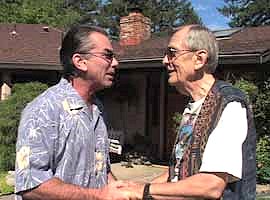 |
| Stanley Krippner |
Stanley Krippner, the Alan Watts Professor of Psychology at the Saybrook Graduate School and Research Center in San Francisco, is internationally known for his pioneering work in the scientific investigation of human consciousness, and especially of what he has come to call anomalous experiences — precognitive dreams, parapsychological phenomena, hypnosis, dissociation, altered states of consciousness, psychic surgery, and shamanism.
He has served as President of the Association for Humanistic Psychology, the Parapsychological Association, and the International Association for the Study of Dreams; he is a Charter Member of the International Society for the Study of Dissociation; he is a Fellow of the Society for the Scientific Study of Sex, the American Society of Clinical Hypnosis, and the Society for the Scientific Study of Religion. He is the author or co-author of more than 900 articles, chapters, and book reviews appearing in scholarly or academic publications.
 |
| Stanley Krippner (right) with Grateful Dead drummer Mickey Hart |
It is largely through his efforts that the study of such anomalous experiences — previously ignored, marginalized, or pathologized — has been brought into the mainstream of psychological research. Krippner has insisted unwaveringly over the years that psychologists must take these experiences seriously, and that this seriousness includes unbiased and rigorous scientific examination.
Two events, I think, mark the culmination of these lifelong efforts. In 2000, the American Psychological Association published Varieties of Anomalous Experience: Examining the Scientific Evidence, co-edited by Krippner, containing scholarly articles examining, among other things, hallucinations, synesthesia, lucid dreams, out-of-body experiences, past-life experiences, alien abduction experiences, and near-death experiences. And, in 2002, Krippner was awarded the American Psychological Association Award for Distinguished Contributions to the International Advancement of Psychology.
Bruce Eisner, author of Ecstasy: The MDMA Story, calls Krippner “both one of the most important contemporary psychologists and one of the only authentic countercultural icons still living.”
The following is a thirty-minute interview with Krippner on the subject of ayahuasca, the “brutal teacher.” The interview is a mix of reminiscence, reflection, and insight delivered in Krippner’s typically understated manner. There is a characteristic Krippner moment when he looks at the interviewer and says, “I doubt that. I would like to see experimental data.”

- Previous Post: Nip/Tuck
- Next Post: Painting the Plants with Light
- More Articles Related to: Ayahuasca, Research Studies



Dear Mr. Kripnner,
I am so glad I found you. You are the best in the world.
What do you think about the husband of Ayahuasca, called Iboga and what do you think about her daughter, the mandrake of Europe.
Similar plants, different effects and every continent has its own.
I have a question, there are so many stories about contra-indications.
What are the real contra-indications for Ayahuasca?
Thank you very much for your answer and time,
With a heartregard from the farm,
Maria Straatman
Iboga has shown great promise not only as a modifier of consciousness but a a plant medicine used, for example, to treat addiction to heroin and similar drugs.
The mandrake plant also has medicinal properties, but of a different sort. This trio, or family, has been revered as sacred in many indigenous traditions, usually separately. Contraindications? Ayahuasca is not for everyone. It is a brutal teacher and needs to be treated with respect and preparation. Its lessons are invaluable but only for those who are ready to receive them.
After 20+ years of knowing ayahuasca, I agree with everything Dr. Krippner says except for its being ‘brutal’ — it has been very kind and gracious to those who come to her with respect and sincerity. But those who just wanted to ‘trip’ ended up purging from both ends all night!